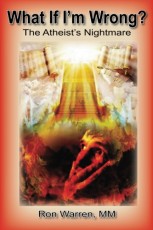
What If I'm Wrong?: The Atheist's Nightmare Kindle EPUB
If you were sitting on a jury, you are required to make a decision. How much evidence would you require to convict or acquit? Would you convict on circumstantial evidence only or would you want as much evidence as you can get? Would you want that evidence to come from only one source or from many sources?
Now answer another question: What if you thought something was true, and you found out it was wrong, when would you want to know it?
Ron Warren was a good atheist. He applied five major battlegrounds that an atheist would use.
These battlegrounds asks the questions:
- Does God Exist?
- Is the Bible True?
- Is there a Resurrection?
- Is Jesus God?
- Is Jesus the only way to God?
In these battlegrounds his weapons was questions, gently attacking the believers through the “WHY” of their belief.
He understood that the “WHAT” of their faith was the doctrines and traditions. The “HOW” of their faith was the process of their actions, but the “WHY” was their purpose.
By applying doubt to the believer’s “WHY,” the same doubt would move into the “HOW” and the “WHAT” of their faith.
When Ron realized he was wrong, he began to use stronger facts to change the battlegrounds.
What does this mean to you?
As an atheist, you have your answers, but are you sure you have all the facts? What are the consequences if you are wrong?
As a believer, have you ever doubted your faith and wished you had answers to fight your battlegrounds? How do you counterattack what the atheist is giving you?
This book opens the door to both the atheist and the believer. It can change or destroy the atheist’s foundation and strengthen and consolidate the believer’s trust and faith in God.
After reading this book, these questions must be asked: Have we presented only circumstantial evidence or have we presented facts that can be tracked, studied, and tested by many sources? Have your answers given you any cause to rethink your position?
As a member of the jury, the decision is yours, but ask yourself another question: What if you are wrong?
Check out the book with this free excerpt!

